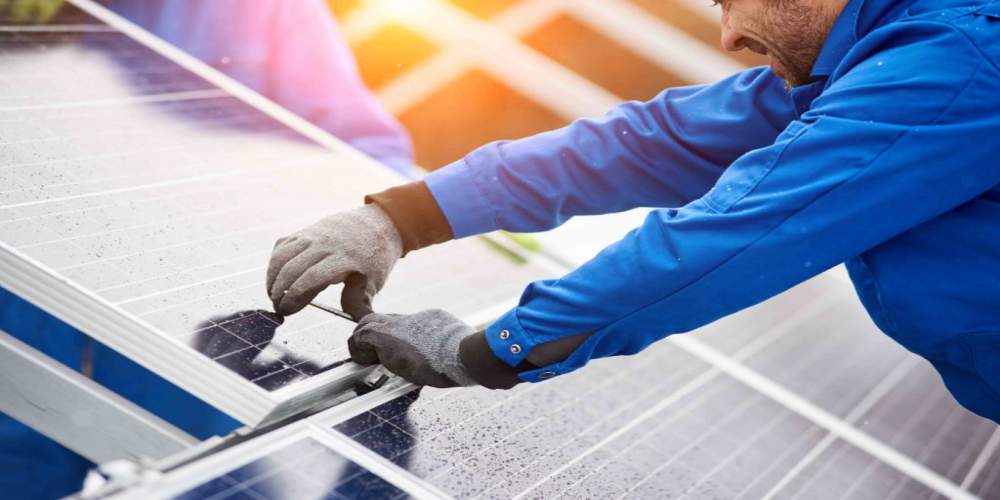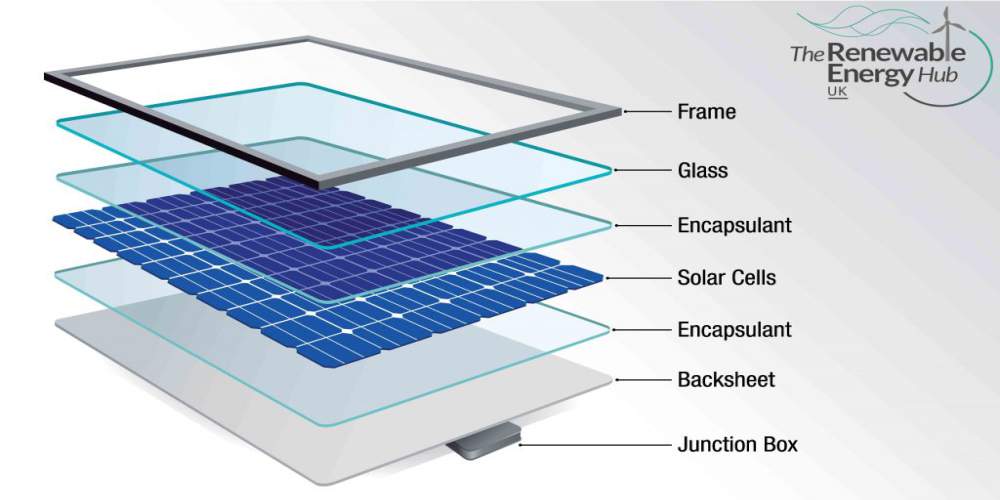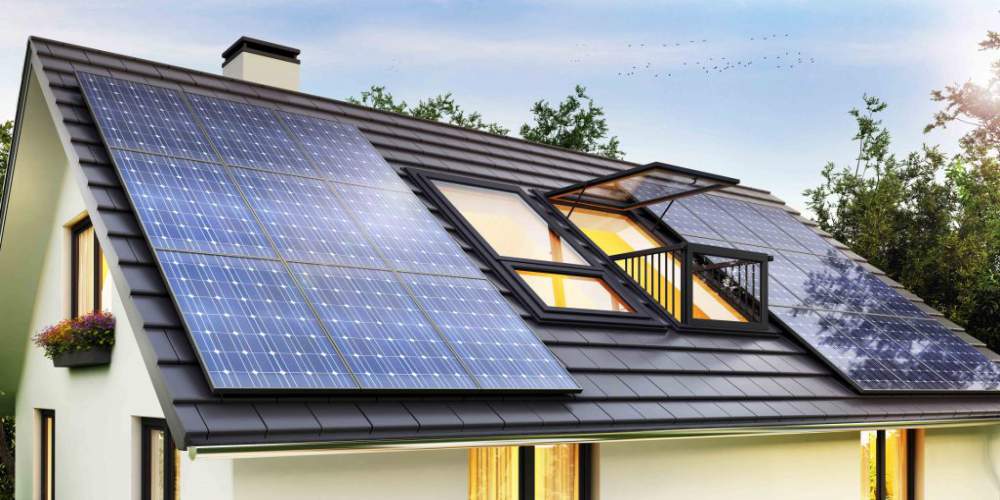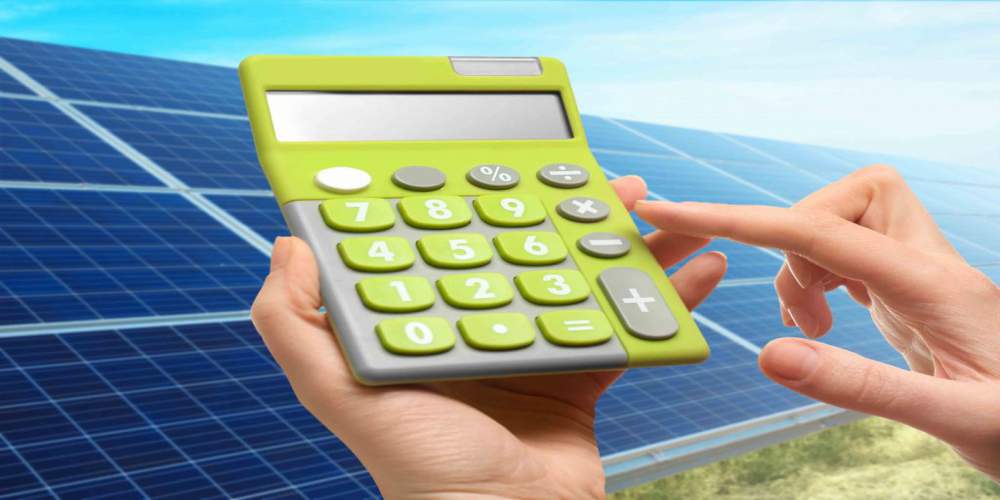Read Time : 8 Minutes
A Complete Guide to Solar Panels in 2023
Solar Panel Information
Solar panels to generate electricity, solar PV, are the world's leading renewable technology. They're now used to power homes, businesses and even cities. They harvest the natural power of the sun to create the electricity that modern life demands in an eco-friendly and cost-effective way.

Solar panels give us a greener alternative to other forms of power as they do not pollute or emit greenhouse gases whilst operating. There have been many advancements over the years into the technology of PV modules and more recently battery storage. Generally, leading to increased efficiency. They are now more than ever, accessible and affordable. Solar can save homes and businesses fortunes a year on electricity bills whilst reducing carbon emissions.
Solar power works using multiple, individual PV cells and conductive materials which are constructed into a panel. In conjunction with an inverter they generate electricity for use around your home. There are a few things we can look at to help you decide if installing solar panels could be right for you.
Types of Solar Panels
Firstly, the types of solar PV panel and which ones you choose, will depend on what you need them for, as well as the space you have available and the money you are willing to spend on them. Solar cells have come a long way since they first began in 1954. They are now much more advanced, making them not only more efficient but more aesthetically pleasing too. The main types of solar panel available are: Monocrystalline solar module: these kinds of solar panels take up less space than the polycrystalline panels but are about the same efficiency.
They can be more expensive, however. Polycrystalline solar module: the process of making these panels is much simpler. This makes them cheaper, however they are slightly less efficient at high temperatures but not enough to worry about when used for residential purposes. They do, however, require more space as you tend to need more of them. Thin film solar cells: these work by using substrate and photovoltaic cells and using several layers of the material onto a substrate base. There are various materials that can be used, they are simple to produce en masse and can be cheaper and more flexible. Amorphous silicon solar cell: these usually have several layers which are stacked to increase their efficiency, however, compared to other types these are less efficient. Biohybrid solar cell: these have been made to utilize a more natural method of photosynthesis by combining organic and non-organic matter.
This means almost 100% efficiency, but they do produce less power overall

You can also buy roof tiles that are solar. These look just like normal roof tiles and can incorporate a battery. If you have a listed property these can often be the better option, and they are most popular amongst those who feel solar panels don’t look very attractive. The tiles are considerably more expensive than photovoltaic pv as you’re probably looking at around £10,000 for an average home of 3 people. There is also a difference between solar panels and solar cells. Solar cells contain all the necessary parts to convert sunlight into electricity. The cells are connected to create a solar panel which generates more electricity.
Energy storage is becoming increasingly efficient. With solar batteries becoming more popular, energy your system produces during the day can be stored for use at night or on cloudy days when less power is produced. This is a good way to ensure your home is even more energy efficient and you get the best out of your panels. It is a common misconception that the sun must be directly shining on a solar panel for it to work efficiently, as this is not true. They can still produce electricity even on dull days, but they will work far more efficiently on sunny days in the summer than winter as the sun is higher in the sky.
The best panels can have an efficiency of around 22%. This is very high efficiency as most are around 15%.
The Benefits of Solar Panels
There are many benefits to generating solar electricity, here are few:
- It’s green: there are no pollutants produced while solar panels operate, so by using them you are using clean energy to power your home or business, reducing your carbon footprint.
- Save on cash: any electricity you produce is totally free of charge and you can use it to power anything within your home or business for free. This will of course lower your energy bills and save you cash in the long term. You will also be able to make money from the Smart Export Guarantee which replaced FIT, meaning a quicker return on investment.
- No planning permission: installing solar panels doesn’t require special permission. There are some rules that need to be followed but mostly it’s simple.
- Its renewable: the sun won’t be running out any time soon and they even work on cloudy days, so you should have plenty of free electricity all year round. Add a battery storage device to save any electricity you produce that you don't use during the day and use it in the evening when the sun isn't shining. It will cut your carbon footprint as a bonus too.
- Efficient all year: they can produce energy all year, not just when the sun shines most.
Are there disadvantages?
Yes, there can be some, the main one being cost. There is initially a high cost to installing them, although this has decreased a lot over the years and will continue to do so. They have become cheaper and easier to manufacture meaning the cost of purchasing them has significantly lowered. Also, the savings you make on energy bills will in the end outweigh this initial cost. The next thing to consider is dependence on sunlight. They are most effective in bright sunlight; however, they do work on cloudy days. They cannot work during the night so some power from the grid will need to be used during certain times.
The best way to maximise their efficiency is by using a battery to store power ready to use during the evening. The long-term benefit of installing solar does outweigh the initial investment as it can save you money. As solar panels have no moving parts, very little service and maintenance is required. Unlike a boiler, your solar panels should work efficiently without a yearly service. We get enough rain in the UK so that you don’t usually need to clean them. If you think your solar panels are not producing enough energy, then there are checks you can do or you can simply contact a certified installer to service your solar panel system. Solar panel warranties vary, depending on the manufacturer and model you go for.
Generally, you'll find that the panels themselves will be covered for 10-25 years. Solar panels tend to last for 25-30 years - that’s at least 25 years of lower energy bills! Even better, the panels won't simply stop working after several decades. However, inverters will probably need to be changed after 10/20 years.
Find a local installer
Welcome to the biggest directory of UK renewable energy companies
Are Solar Panels Suitable for my Property?
Always check what is suitable for your home before you make the investment. You should think about location and which way your roof faces. In the UK south is best as your panels will be receiving sunlight all day. Also look at your roof. How big is it? How many panels do you need? Will they fit? make sure they won’t be shaded too much by things like big trees. It is important to get good quality quotes that take all these things into account. Initial cost for a photovoltaic system can be around £4000/£8000. The more roof space you have available the more you can get out of your pv system.

For a 28m2 roof with a 4kw system you could make savings of between 40% and 50% on your utility bills depending on how you use electricity in your household. This is the kind of system an average house would need at a cost of around £4500/£6000. Once your initial cost is covered, you will start making and saving money. There are many things to consider when looking at the price of solar – it does vary depending on a range of circumstances. Here is a table with some estimates of pricing and roof size
| Property Type | Approx. Roof size | Approx System size | Average System cost (incl. VAT @ 5%) | CO2 Saved Per Year (tonnes) | Approximate Yearly System output |
|---|---|---|---|---|---|
| Small array | 8m² | 1kWp | £2,500 - £3,000 | 0.5 | 900 kWh |
| Small semi-detached | 15m² | 2kWp | £3,000 - £4,000 | 1 | 1,800 kWh |
| Average semi-detached | 21m² | 3kWp | £4,000 - £6,000 | 1.5 | 2,700 kWh |
| Average detached | 28m² | 4kWp | £6,000 - £8,000 | 2 | 3,400 kWh |
Grants for solar
The Feed-In Tariff scheme which was launched in April 2010 closed for new customers at the end of March 2019. Those with existing contracts are not affected and continue to be paid. Under the Feed-In Tariff scheme there were two payments, a “generation tariff” and an “export tariff”.

The “generation tariff” paid for all the electricity that a household generated. Rates were set by the government and depended on the size of your solar PV system and when you signed up to the scheme. In the early years rates were much higher – some paid more than 50p per kilowatt hour but were cut over the years and fell to around 4p for new customers by March 2019. Once you had secured a rate it was fixed for the life of your contract, typically 20 or 25 years. The payments reduced the overall time it took to get back your initial investment.
The government abolished the FIT this year due to solar panel prices decreasing and being much more affordable.The “export tariff” paid homeowners for the surplus energy they exported to the national grid. Rates were fixed by government for the entire contract term and were around the market rate for electricity. It was 3.82p/kWh until August 2012 and then 5.38p until the Feed-In Tariff scheme ended. Under the Feed-In Tariff all households were paid the same rate which was 50% of all the energy generated by the solar panels. The actual amount exported to the grid was not measured, so everyone got this regardless of how much electricity they exported.This has changed slightly in 2019 and is called the generation rate tariff.
Your supplier agrees a set rate to pay you for the energy per kWh you generate. It is important to say that the rate will change each year for new projects and will change based on inflation. The payments will be like the FIT and will be paid to you for 20 years and more probably, for as long as the system generates enough energy. Though the Feed-In tariff has come to an end, some of the excess electricity generated by your solar energy will inevitably go back to the grid and as under current legislation it would be illegal not to be paid for this a new system has been devised.
This is where the Smart Export Guarantee comes in to play. ‘Rent a roof’ schemes no longer exist due to the government scrapping the FIT. There is also the renewable heat incentive (RHI). This can be used with ‘solar thermal’ systems that warm your hot water. Payments are made for up to 7 years and based on the amount of heat your system makes. If you own your own home in England, Scotland or Wales, you can apply via the government website.
Smart Export Guarantee
The Smart Export Guarantee is good news if you are hoping to make your money back on your initial investment. After the government announced the changes to the FIT, new projects were thrown into uncertainty, but the government now has a plan for the future of the solar industry. So, what is the Smart Export Guarantee? Final proposals for the Smart Export Guarantee were published by the government on Monday, 10th June 2019. The Smart Export Guarantee requires medium to large electricity supply companies including SSE, EDF Energy, British Gas, npower, EON UK and ScottishPower (those with more than 150,000 electricity customers) to offer a Smart Export Guarantee (SEG). Smaller suppliers can do so on a voluntary basis.
Suppliers are already starting to offer SEGs, but all qualifying suppliers will have to offer you terms of payment for your solar power, wind power & other renewable energy exports by January 1st, 2020, at the latest. This is good news for solar panel owners, because most likely the scheme will naturally become marketised, rather than subsidised. In the past the Feed in Tariff offered a fixed rate determined by government. Now, instead of a subsidy, the new guarantee will be a minimum rate. Once the new system has kicked in, it seems inevitable that there’ll be competition between energy suppliers to offer better tariffs in order to gain your loyalty. In order to benefit from the new proposed Export Guarantee scheme, you must have an MCS certified installation. Importantly, anyone who installed solar panels between the end of the Feed in Tariff and the start of the new scheme will be eligible for the new scheme.
The Solar Trade Association has been arguing for households to be paid at a fair market rate for the power they contribute to our electricity system, as all other generators are. There are two obvious ways to define fair pricing. One is through wholesale prices, which is the price that the market buys power from to sell to you – in 2018 this averaged around 6p/kWh. The other is the ‘System Sell Price’, which the government referenced as a fair price in its SEG consultation. This is the price that larger generators receive for their surplus power when they produce more electricity than they had contractually arranged to produce. The annual average System Sell Price last year was very similar (5.4p/kWh) to the previous FIT export tariff payment of 5.2p/kWh. This is a very positive development for anyone considering going for solar panels but delaying doing so because of the loss of the Feed in Tariff.
Not only have prices come down considerably over the past decade, but the new scheme is also likely to end up being more generous than the current tariff. With the cost of solar having fallen by 80% since 2008, it was the right time to review the way these payments were made. Households and businesses installing new solar panels will be guaranteed payment for power provided back to the grid to unlock the smart energy systems of the future. This can only be an important upgrade to the current Feed-in Tariffs scheme.
The Smart Export Guarantee will see electricity suppliers paying new small-scale energy producers for excess electricity from homes and businesses being put back into the energy grid. The new scheme could create a whole new market, encouraging suppliers to competitively bid for this electricity, giving exporters the best market price while providing the local grid with more clean, green energy, unlocking greater choice and control for solar households over buying and selling their electricity. Currently, the government has only obligated electricity supply companies to buy power at a price above zero.
The good news is the electricity sector is changing fast and there are many suppliers who want to embrace smart energy to help deliver a much more efficient, low-carbon power system, and they want customers who want to participate. Companies early to uptake the new system include, Octopus who are offering both flexible and fixed SEGs, Bulb who are offering members who generate their own electricity payment for any electricity they generate and export to the grid (This is for solar-only customers, storage-only or solar and storage co-located), and EON who are paying the first 500 new solar customers 5.24p per every kilowatt-hour (kWh) of energy exported back to the grid on the assumption that 50% of generation is exported.
The more complex new system will take a while to become established but there are still savings to be made which will increase as all the big energy companies come on board and start competing with one another.
DIY solar
We often get asked if it's possible to buy the solar panel kit and install the system yourself. This can be possible in some cases and there are some easy to install solar kits around that could save you money.
That said there are some considerations:

In order to benefit from the Smart Export Guarantee (SEG), you must have an MCS certified installation. This means the products installed must be MCS certified and the installation must be signed off by an MCS accredited installer to make sure that safety standards are met. It may be difficult to get an MCS installer to sign-off on a system they didn’t install themselves.
There could be issues if you wish to sell your property. Surveyors will likely look for the relevent paperwork to make sure the system meets safety standards.
Home insurance can also be compromised, so make sure you contact your insurance company in advance of installing any solar technology yourself.
For further information, check the 'Further Reading' section on the right, give us a call or use the contact Us form in the header.
COMPARE PRICES FROM LOCAL INSTALLERS
Compare prices from local companies fast & free
Enter your postcode to compare quotes from leading professionals. We promise to keep your information Safe & Secure. Privacy Policy





 How Much do Solar Panel Systems Cost in 2024?
How Much do Solar Panel Systems Cost in 2024?







